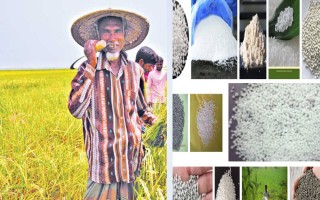Govt failure puts farmers at input traders’ mercy
Agro input companies are thriving on the government failure to keep farmers informed about the new technologies in agricultural production, leaving the growers more and more dependent on the companies.
Successive governments over the years pushed the farmers to quit the traditional ways for producing more but did little to equip them with the required knowledge.
These companies have opened helplines, which are actually all about marketing their own products, persuading the farmers to buy from them.
Their toll-free helplines are popular among farmers who have to count Tk 0.25 per minute to contact the government for information.
This growing dependence on the companies has caused concerns among experts who consider the uninformed farmers vulnerable to various manipulations.
Maruf Miah, a farmer from Rajshahi, who travelled many places to get strawberry seeds, relates how misleading information could make farmers suffer.
A private company helpline had told him that strawberry cultivation would require quality seeds first.
Maruf later came to know that stem cutting was the method for cultivation.
‘It cost me a lot – both time and money,’ regretted Maruf.
But companies are happy with the rapid expansion of their business.
‘This is simply great. We sell products and serve farmers at the same time,’ gloated Afzal Hossain, senior general manager at Metal Agro Limited.
He revealed that his company’s business grew by 30 per cent every year since it opened a helpline in mid-2014.
Another agro input company, the Supreme Seed Company Ltd, in a video promotional, revealed that the number of calls it received from farmers increased to 250 a day currently from only six when it opened a helpline in 2015.
The company has already reached over a quarter of a million farmers and wants to reach 2 million more by 2020.
On an average, said Petrochem (Bangladesh) Limited general manager Partha Sharathi Roy, a farmer talk for more than six minutes with them, seeking specific information, like looking for a pesticide for treating a particular disease.
‘Here is where the opportunity for expanding our business lies. We link farmers up to specific products,’ said Partha.
Sher-e-Bangla agricultural university agricultural extension and information system professor Abul Bashar, however, expressed his concern terming the practice dangerous.
The motivation of the companies, he feared, might be making money rather than disseminating scientific knowledge.
What was more concerning was that mostly non-agriculturists were answering farmers’ quarries based on a predetermined database, Bashar observed.
Bangladesh Agricultural University agricultural finance professor ASM Golam Hafeez said that farmers would not have relied on private companies, had they got it from the government.
‘The government agriculture information service is very poor and the farmers are helpless,’ noted Golam Hafeez.
The input companies, said Hafeez, often made farmers buy from them more than what was really necessary.
‘Right information could reduce farmers’ production cost significantly,’ he added.
Agriculture information and communication specialist at Department of Agricultural Extension Mohammad Maroof pleaded that for lack of resources it was difficult to ensure smooth supply of information to about 1.85 crore families of farmers.
‘Our resources are limited. Still we are trying our best to meet the demand,’ said Maroof.
There are five agriculturists taking calls from farmers during office time six days a week at the call centre run by Agriculture Information Service at DAE headquarters. Overwhelmed with calls, they could answer only half the callers, he claimed.
According to AIS, between June, 2014 and December 2017, the call centre received 1,50,114 calls. The number of calls abandoned during the same time was 1,61,550. The AIS said that they could answer 60 calls a day on an average currently.
Besides, some programmes on agricultures, aired by televisions and radios, are not adequate to meet the demand for information.
News Courtesy: www.newagebd.net











